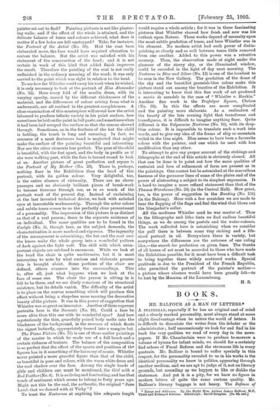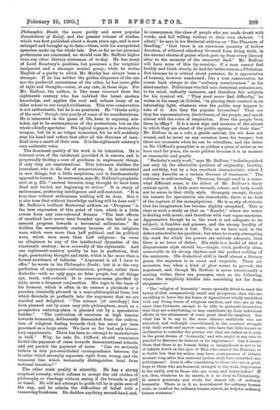BOOKS.
MR. BALFOUR AS A MAN OF LETTERS.*
A STATESMAN, especially if he has an original cast of mind and a clearly marked personality, must always stand at some slight disadvantage when he enters the world of letters. It is difficult to dissociate the writer from the debater or the administrator ; half unconsciously we look for and find in his book the very qualities we read of every day in the news- papers. If Mr. Chamberlain were to produce to-morrow a volume of hymns for infant minds, we should for a certainty find echoes of Fiscal Reform and the strenuous life in every quatrain. Mr. Balfour is bound to suffer specially in this respect, for the personality revealed to us in his works is the identical personality we know in politics, appearing through another medium, and we are apt to judge of it, not on literary grounds, but according as we happen to like or dislike the statesman. And yet it is a pity, for we have no figure in modern letters of quite the same curious quality. Mr. Balfour's literary baggage is not heavy. The Defence of • Essays and Addresses. By the Right Hon. Arthur James Balfour, M.P. Third and Enlarged Edition. Edinburgh : David Douglas. Us, dd. net.]
Philosophic Doubt, the more portly and more popular Foundations of Belief, and the present volume of studies, which was first published about a dozen years ago, and is now enlarged and brought up to date,—these, with his unreprinted speeches, make up the whole tale. But, so far as our personal preferences are concerned, we should rate Mr. Balfour higher than any other literary statesman of to-day. He has many of Lord Rosebery's qualities, but possesses a far weightier equipment and a stronger mental grasp ; while he writes English of a purity to which Mr. Morley has always been a stranger. If he has neither the golden eloquence of the one nor the perfervid earnestness of the other, he has rarer gifts of style and thought,—rarer, at any rate, in these days. For Mr. Balfour, the author, is like some revenant from the eighteenth century who has imbibed the latest modern knowledge, and applies the cool and urbane irony of an elder school to our turgid civilisation. This true conservative is not enthusiastic, but he is no pessimist. He "thinks nob;y of the soul," though very poorly of some of its manifestations. He is interested in the game of life, keen in exposing mis- takes, apt to be contemptuous of the pretentious, but on the whole a kindly spectator. His logical organon is a destructive weapon; but he is no vulgar iconoclast, for he will suddenly stay his hand and reflect that after all the illusions of man- kind have a merit of their own. It is the eighteenth century's own authentic voice.
The dominant quality of his work is its toleration. He is tolerant even of the intolerant provided it is sincere, and is perpetually finding a core of goodness in unpleasant things, if only they are unpretentious. This tolerance dislikes the iconoclast, who is the foe of conservatism. It is interested in new things, but a little suspicious, and is fundamentally opposed to heresy. In economics, says Mr. Balfour's prophetic soul on p. 225, " ancient heresies, long thought to have been dead and buried, are beginning to revive." It is chary of enthusiasm, preferring intelligence and self-restraint. "It is true that without enthusiasm nothing will be done. But it is also true that without knowledge nothing will be done well." Mr. Balfour's brilliant Rectorical address on " Progress " is the best expression of this point of view, which is a little averse from any rose-coloured dreams. " The best efforts of mankind have never been founded upon the belief in an assured progress towards a terrestrial millennium." He dislikes the seventeenth century because of its religious wars, which were more than half political, and its political wars, which were more than half religious : he owns no allegiance to any of the intellectual dynasties of the nineteenth century ; he is avowedly of the eighteenth. And one eighteenth-century quality be has in perfection, that logic, penetrating thought and style, which is far more than a formal avoidance of fallacies. " Argument is all I have to offer•," he wrote in his Philosophic Doubt ; but it is the very perfection of argument—ratiocination, perhaps, rather than dialectic—with no ugly gaps, no false purple, but all things apt, lucid, well-ordered. It is common-sense glorified by style, never a frequent conjunction. His logic is the basis of his humour, which is often in its essence a platitude or a paradox, ironically phrased in a semi-philosophical form, but which dovetails so perfectly into the argument that we are startled and delighted. " The science [of sociology] has been planned out by some very able philosophers, much as a prospective watering-place is planned out by a speculative builder." " The cultivation of emotions at high tension towards humanity, deliberately dissociated from the cultiva- tion of religious feeling towards God, has never yet been practised on a large scale. We have so far had only labora- tory experiments. There has been no attempt to manufacture in bulk." Why, he asks Dr. Clifford, should conscience forbid the payment of rates towards denominational schools, and yet permit the payment of taxes. " Can we seriously believe in this pre-established correspondence between the frontier which eternally separates right from wrong, and the transient line which technically distinguishes local from national taxation ?"
The other main quality is sincerity. He has a strong sceptical honesty, which refuses to accept the old clothes of philosophy or theology without seeing if the brocade is gold or tinseL He will not attempt to guide till he is quite sure of the way, and he admits the difficulties of belief with a reassuring frankness. He dislikes anything second-hand, and, in consequence, the class of people who are made drunk with words, and fall willing victims to their own rhetoric. " I admit," he says in his Rectorial address on " The Pleasures of Reading," "that there is an enormous quantity of hollow devotion, of withered othodoxy divorced from living faith, in the eternal chorus of praise which goes up from every literary altar to the memory of the immortal dead." Mr. Balfour will have none of this lip-worship ; if a man cannot feel freshly and think clearly, he had far better remain a Philistine. But because he is critical about pretence, he is appreciative of honesty, however unadorned ; like a true conservative, he comes back always to the "ordinary consciousness" as his sheet-anchor. Politicians who fall into rhetorical ecstasies are, to his mind, radically insincere, and therefore fair subjects for his ironical wit. " They need never find difficulty," be writes in his essay on Cobden, "in placing their conduct in an interesting light, whatever view the public may happen to take of it. Are they the popular favourites ? Then are they the representatives, the tribunes, of the people, and speak almost with the voice of inspiration. Does the people burn them in effigy P It is a mere sign and measure of the extent to which they are ahead of the public opinion of their time." Mr. Balfour is, as a rule, a gentle satirist, his wit does not wound, and he never on any occasion loses his temper; but there are moments when he can be relentless, and the letter on Dr. Clifford's pamphlet is as pitiless a piece of satire as we have read for years, the more pitiless because it is in manner so reasonable and gentle.
"Berkeley's early work," says Mr. Balfour, " is distinguished not only by the admirable qualities of originality, lucidity, and subtlety, but by a less excellent characteristic, which I can only describe as a certain thinness of treatment." The criticism in self-revealing. Thinness, though used in a some- what different sense, is the defect of Mr. Balfour's finely critical spirit. A little more warmth, colour, and body would not be amiss in that chilly style. Strangely enough, though his talents for speculation are remarkable, there is no hint of the rapture of the metaphysician. He is so shy of rhetoric that his imagination has become slightly atrophied. This is clear in such a study as that on " Handel," where the writer is dealing with music, and therefore with vast vague emotions. Appreciative though he is, the work is not adequate to its subject; it fumbles and guesses, and the strong lucidity of the critical organon is lost. This, as we have said, is the defect attached to his qualities ; but when he is only attempting the work for which his powers are entirely adequate, then there is no trace of defect. His style is a model of what a dispassionate style should be,—simple, vivid, perfectly clear, memorable in its strong rhythm and the perfect welding of the sentences. His dialectical skill is itself almost a literary grace, the sequence is so exact and exquisite. There are moments, too, when a kind of glow seems to pervade the argument, and, though Mr. Balfour is never intentionally a moving writer, there are passages, such as the following, where the simplicity kindles into something not far from eloquence :- " The religion of humanity' seems specially fitted to meet the tastes of that comparatively small and prosperous class who are unwilling to leave the dry bones of Agnosticism wholly unclothed with any living tissue of religious emotion, and who are at the same time fortunate enough to be able to persuade themselves that they are contributing, or may contribute, by their individual efforts to the attainment of some great ideal for mankind. But what has it to say to the more obscure multitude who are absorbed, and well-nigh overwhelmed, in the constant struggle with daily needs and narrow cares ; who have but little leisure or inclination to consider the precise role they are called on to play in the great drama of humanity,' and who might in any case be puzzled to discover its interest or its importance? Can it assure them that there is no human being so insignificant as not to be of infinite worth in the eyes of Him who created the Heavens, or so feeble but that his action may have consequences of infinite moment long after this material system shall have crumbled into nothingness ? Does it offer consolation to those who are in grief, hope to those who are bereaved, strength to the weak, forgiveness to the sinful, rest to those who are weary and heavy-laden P If not, then, whatever be its merits, it is no rival to Christianity, It cannot penetrate and vivify the inmost life of ordinary humanity. There is in it no nourishment for ordinary human souls, no comfort for ordinary human sorrow, no help for ordinary human weakness."







































 Previous page
Previous page